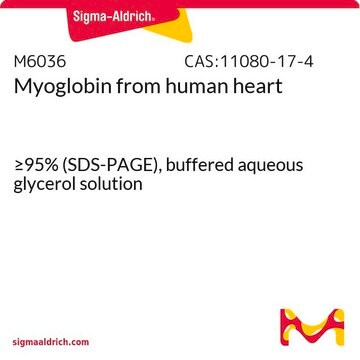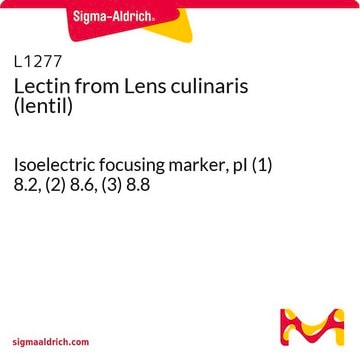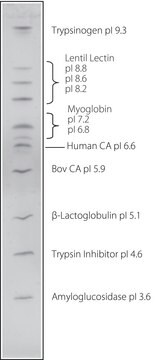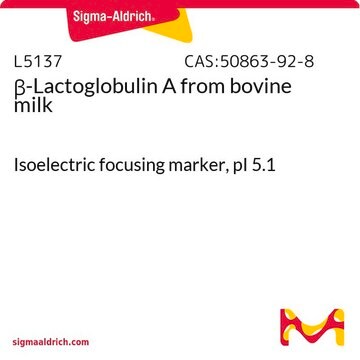M9267
Myoglobin from equine heart
Isoelectric focusing marker, pI (1) 6.8, (2) 7.2
Synonym(s):
Myoglobin from horse heart
Sign Into View Organizational & Contract Pricing
All Photos(1)
About This Item
Recommended Products
Looking for similar products? Visit Product Comparison Guide
Application
Myoglobin from equine heart has been used as a pI marker in two-dimensional gel electrophoresis.
Biochem/physiol Actions
Myoglobin from equine heart is a protein which is used as a standard pI marker for isoelectric focussing experiments.
Application
Product No.
Description
Pricing
related product
Storage Class Code
11 - Combustible Solids
WGK
WGK 3
Flash Point(F)
Not applicable
Flash Point(C)
Not applicable
Personal Protective Equipment
dust mask type N95 (US), Eyeshields, Gloves
Choose from one of the most recent versions:
Already Own This Product?
Find documentation for the products that you have recently purchased in the Document Library.
Customers Also Viewed
Purification and some properties of a protopectin-solubilizing enzyme that has potent activity on sugar beet protopectin
Takuo S and Sakamoto T
Agricultural and Biological Chemistry, 54, 879-889 (1990)
Two-dimensional gel isoelectric focusing.
Stastna M and Slais K
Electrophoresis, 26, 3586-3591 (2005)
Forskolin and camptothecin induce a 30 kDa protein associated with melatonin production in Y79 human retinoblastoma cells.
Janavs JL, et al.
The Journal of Neuroscience, 15, 298-309 (1995)
Yie-Hwa Chang et al.
Vaccines, 8(3) (2020-07-30)
Francisella tularensis (F. tularensis) is an intracellular pathogen that causes a potentially debilitating febrile illness known as tularemia. F. tularensis can be spread by aerosol transmission and cause fatal pneumonic tularemia. If untreated, mortality rates can be as high as
Ying Guo et al.
BMC microbiology, 8, 226-226 (2008-12-19)
Iron is recognized as an important trace element, essential for most organisms including pathogenic bacteria. HugZ, a protein related to heme iron utilization, is involved in bacterial acquisition of iron from the host. We previously observed that a hugZ homologue
Chromatograms
application for HPLCOur team of scientists has experience in all areas of research including Life Science, Material Science, Chemical Synthesis, Chromatography, Analytical and many others.
Contact Technical Service









